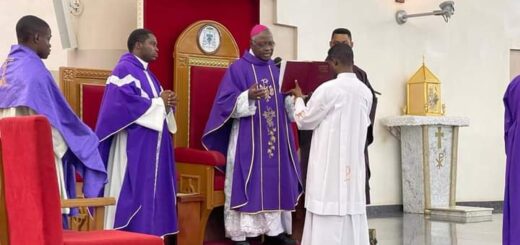Rejoice in the Lord always
by ARCH BISHOP · December 12, 2021
Third Sunday of Advent, Year C, December 12, 2021, at St. John the Baptist Parish, Mpape. Homily by Archbishop I. A. Kaigama
Readings: Zeph. 3: 14-18, Ps. (Is. 12), Phil. 4: 4-7, Lk. 3: 10-18.
Rejoice in the Lord always (Philippians 4:4)
The third Sunday of Advent urges us to sing and shout for joy (in Latin, Gaudete which means “rejoice”). Today, instead of the usual purple coloured vestment which carries the message of penitence, the liturgical colours are rose, and the readings are laying emphasis on the joyous anticipation of the Lord’s coming at Christmas.
The first reading from the book of Zephaniah speaks of the things that impede the joy of God’s people, which the Lord promised to take away. Zephaniah, who gave this message of joy, gave it at a time when there was no reason for him to be happy. He was living during one of the most difficult times in the history of Israel. It was a time when kings, prophets and the judges of Jerusalem became corrupt, with people abandoning their faith and going after other gods. The prophet calmed their fears by announcing that God would renew them in His love when that day comes, and their fears and worries would be taken away.
In the second reading, St. Paul admonishes the Philippians to rejoice. This message came while he was in prison in Rome around 62 AD. A person who is in prison should not be expected to be happy, but here is a message of joy and hope coming from the darkness of the prison walls (cf. Phil 2:17-18). Why did Paul call for rejoicing and gladness? It was not because he had all the good things the world could offer, but because “The Lord is close at hand” (Phil. 4:5). By this, St. Paul teaches us that our feeling of joy is guaranteed when we are living in God. Christian joy is independent of all things on earth because it has its source in the continual presence of Christ. The lesson from St. Paul here too is that one can choose to rejoice even in the midst of trials and tribulations.
But how can we sincerely rejoice today when COVID-19 continues to force us to stay apart from those we love or hinder travels to meet loved ones? How can we rejoice in the midst of growing insecurity: banditry, kidnapping and severe economic hardship, poor social services and many social vices; in a society that exploits the poor, leaving many people hungry and frustrated, with lack of opportunities and the hopes for a bright future being hijacked by a greedy and privileged few whose comfort are guaranteed at the expense of other Nigerians?
The Gospel offers us a hint of what creates true happiness and joy among the community. John the Baptist whom the people approached to ask what they must do after listening to his preaching, told them that those who have more should give to the less privileged. Admonishing the soldiers, John warned against intimidation, extortion, and urged them to be content with their pay (cf. Lk. 3:14). Those in charge of collecting revenues (Customs/ tax officials) must not collect more than the official amount.
In summary, the message of John the Baptist was hinged on distributive justice, which means giving everyone his or her due. Bringing it home, it means that no businessmen or women should cheat others; those at the check points must not extort money from people; those in charge of drafting our budget must not manipulate it in order to make themselves rich, and those in charge of payment of pensioners or workers’ salaries must not delay payment especially now that the costs of essential items are prohibitive.
If politicians had come to John, he would have admonished them to selflessly serve the people and seek to fulfill their campaign promises. If those in business had come to John, he would have told them not to exploit people and be fair in their dealings. If married people had come to John, he would have told them to live by their marriage vows of fidelity and love for their family. If lawyers had come to him he would have told them to uphold justice and not to distort the truth. If doctors had come to him, he would have told them to preserve lives and not to undertake actions that are inimical or detrimental to human life. If Priests had gone to John, he would have told them to bring people closer to God and constantly nourish the people through the Word of God and the Eucharist.
Today, we are called to concretize charity towards those who are helpless and in dire need of basic necessities of life. Christians are also enjoined to focus on God when faced with problems. True joy consists in seeking the good of others and doing all within our means to put smiles on the faces of those who suffer.
For those among us who are in very sad situations, the message of hope today is, “Rejoice, because God is coming among you”. The Lord says, “I know the plans I have for you, plans to bring for you prosperity not disaster, plans to bring about the future you hope for” (Jer. 29:11). “I am doing something new in your midst….” (Is. 43:19). ‘Do not be afraid – I will save you. I have called you by name – you are mine. When you pass through deep waters, I will be with you; your troubles will not overwhelm you. When you pass through fire, you will not be burnt; the hard trials that come will not hurt you” (Is. 43:1-2).
Through the intercession of the Blessed Virgin Mary, may we all be able to smile even when suffering. I invoke God’s blessings on you the Parish Priest, Fr. Hilary Ugiomoh, your assistant, Fr. Moses Ahuywa; those to be confirmed, and indeed all the parishioners of St. John the Baptist, Mpape. May you experience true joy, before, during and after Christmas.




